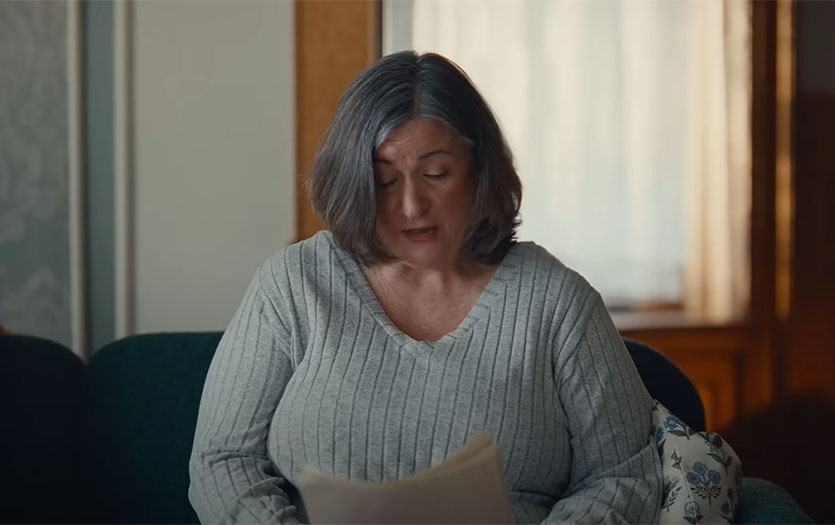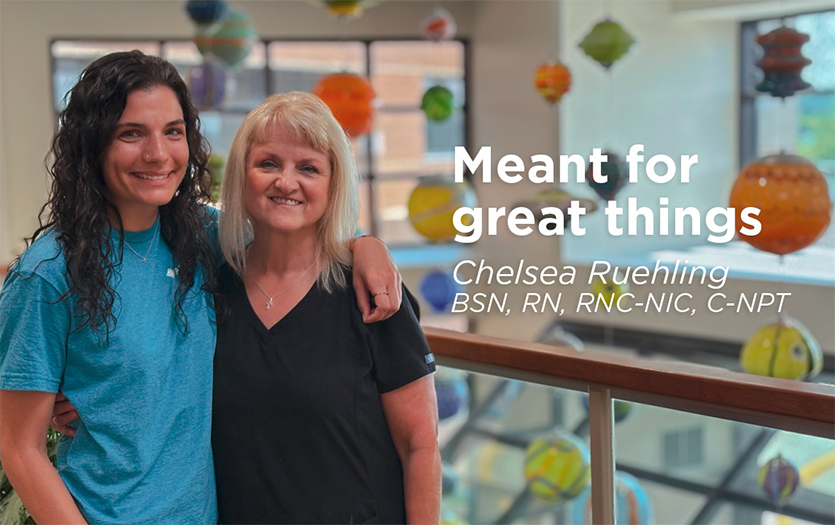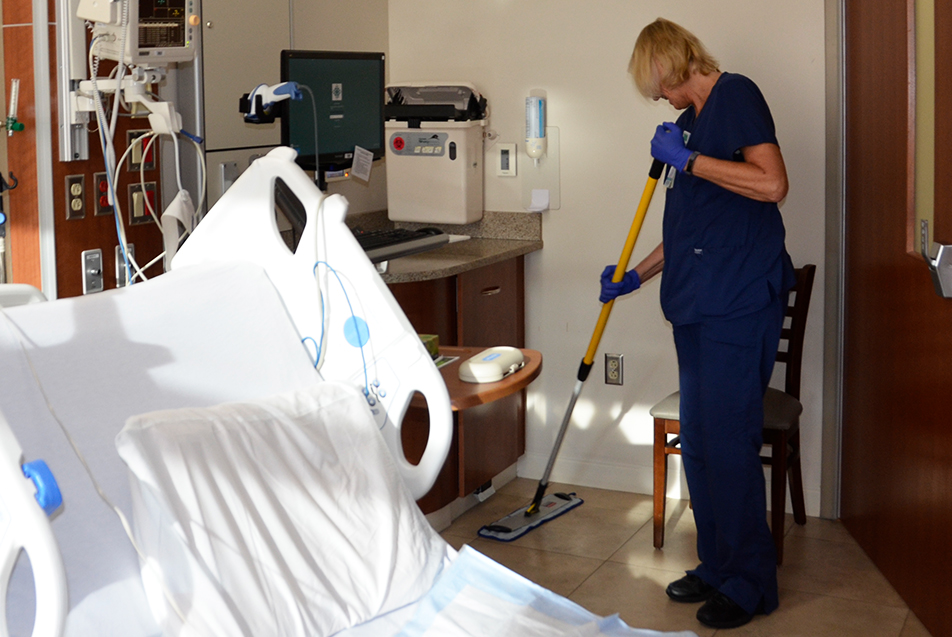
In a quiet room toward the end of the hallway on the 5th floor of Parkview Regional Medical Center (PRMC), a woman sat in her bed wearing a modest baseball cap. When the environmental services tech came in to clean her room, the patient commented on how beautiful the housekeeper’s blonde hair was. It was only by chance that, on the second day of her stay, the patient took her cap off in front of the tech, revealing a bald head. Through conversation, the housekeeper would learn that the patient’s hair had been sacrificed to chemotherapy weeks before, a measure to treat aggressive breast cancer. The patient would share that she never removed the hat, which she purchased for just $2 at a local store. She even slept in it, because she felt ugly and exposed without it.
On the third day, the patient placed her cap on the bed and went into the restroom to freshen up. Hospital staff stripped her bedding and replaced it with clean linens, accidentally taking her baseball cap along with the old sheets. By the time the tech reached her room, the patient was beside herself. She wouldn’t leave her bed for fear people would see her naked scalp.
The tech went in search of the baseball cap. And when it couldn’t be retrieved, she made her way to the hospital gift shop to see what options might be available, her lunch money for the week in hand. Unfortunately, the styles in the store were a bit out of her price range. Just as she was getting ready to leave, the salesperson remembered something. On a forgotten shelf, in the back of the gift shop, was one pink baseball cap with the word “hope” printed above the bill. The salesperson placed the hat in a gift bag for the tech to take back to the patient’s room.
While she wasn’t able to see it with her own eyes, the housekeeper heard recounts of how the patient was discharged later that day, her chin held high with a powder pink cap perched on top of her head, hope in her heart and a huge smile on her face.
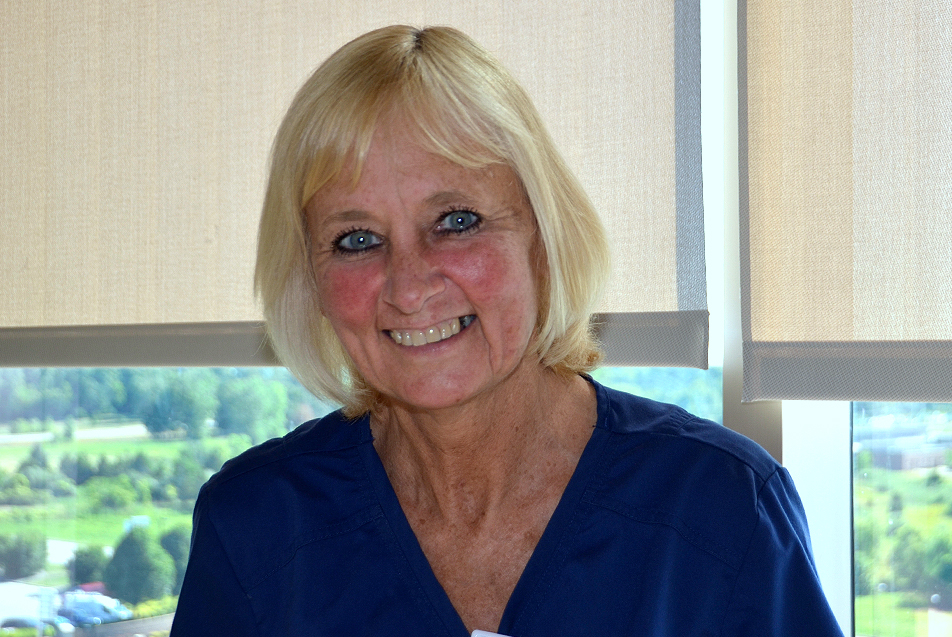
That tech, Dianna Parish-Crumpacker, who so beautifully displayed the standards we strive for with every case, was awarded a recognition coin for the gesture. Though, as she shares the tale months later, she assures me that’s not why she did it. She did it because whether it’s the gift of confidence in the form of a baseball hat, or a blanket from the warmer for a chilled patient, or a cup of coffee for a worried spouse, or encouragement to open the blinds just a bit on a beautiful day, Dianna is wired to care.
I recently spent a shift with her at PRMC. In our short time together, no less than four patients shared that she raised them up during their stay in our facility. I felt the warmth of her contagious character just walking beside her. It was a genuine glow of a different degree of generosity.
We met in the lobby around 8 o’clock in the morning and took the elevator up to the 5th floor. Dianna is responsible for the 18 rooms on the left side of 5-East, a surgical unit. “I call it ‘the sunny side’,” she told me. “We get the sunrise and the other side gets the sunset.”
The Environmental Services team begins the first shift each day with a huddle at 7 a.m. After the gathering, Dianna goes to her cart (stocked smartly the night before) and adds the necessary cleaning chemicals to a tub with mop pads and another with blue and red rags. The cloths are stacked in perfect columns. “Everything makes an impression,” she said, more than a couple of times.
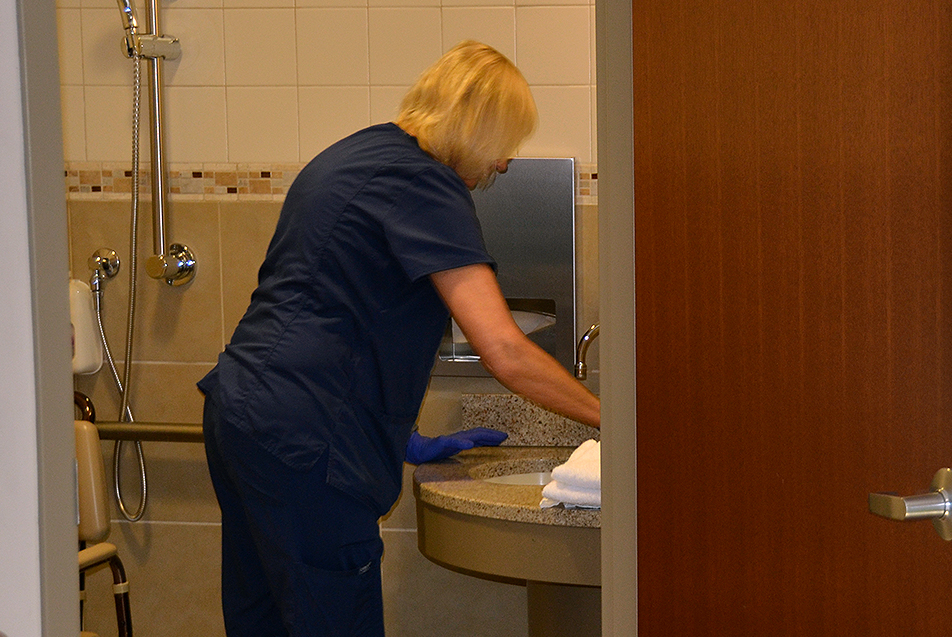
The environmental services techs’ days can be divided into three main tasks: the zoom, dailies and the splash and dash, with checkouts sprinkled in.
Her first order of business, the zoom is when Dianna takes a quick but focused pass through her side of the floor. She checks trash cans, bathrooms and high traffic areas to see if anything needs addressed before she begins her dailies.
By the time I connected with Dianna, her zoom was complete, and she was ready to start working her way down the row of 18 patient rooms she is responsible for sanitizing each day. I stood tentatively behind her as she knocked on the wood door of the first room.
“Good morning!” she chimed.
“Good morning,” the patient echoed.
“I’m here to clean and sanitize your room. Is this an OK time?”
He must have agreed and she promptly pushed the door the rest of the way open, revealing me, standing by her cart with a weighty camera and notebook. My lens is not very discreet, and the patient was quick to question it. Once he realized I wasn’t a true paparazzi and that his jovial housekeeper was my main subject for the day, the conversation started running like a river after a rainstorm. The patient, his spouse, Dianna and I talked about summer garden tomatoes and grandchildren and the beauty of country living, as the heat of the July morning streamed in through the glass window, warming our torsos and faces.
During that time, no one moved but Dianna, who made fast work of the space. She buzzed around our bodies, emptying trash bags and wiping down every counter and tray space, never slowing as she shared her poetic admiration for fresh romas. She attached the mop head to the handle and began swiping the tile, painting a colorless masterpiece around our feet.
It was a choreographed routine I would watch her perform 18 times in the hours to come, though each execution was a little different; Because each room was a little different. And perhaps this is Dianna’s greatest skill of all. She can read a room like a cardiologist reads a chest x-ray. She knows the nuances of how much to talk and when to protect the silence. There were rooms we entered that were dark, and Dianna’s tone changed to a hushed, soothing tenor. There were rooms with the blinds pulled to the ceiling and her inflection mimicked the bright ambiance. If there were caregivers in the room, she would move on, so as not to overwhelm the patient.
This keen ability to navigate the unique sensitivities of our guests is not only her greatest strength, but also her calling. Dianna is blessed with a soul to serve. She’ll tell you, she has a particularly strong soft spot for veterans and the elderly. Both of her sons, now in their 20s, have military backgrounds. She also has parents in their 90s, so it’s easy to put herself in those shoes. “I always remember, that this patient is someone’s mother, or someone’s son,” she said. “You really never know who you’re caring for. You don’t know what their situation is or what they’re going home to. So I do what I can to love on them in the time i spend with them.”
Before leaving this first room of the day, she turned and offered sincerely, “I hope your stay was as pleasant as possible,” handing him a card with her name and number on it.
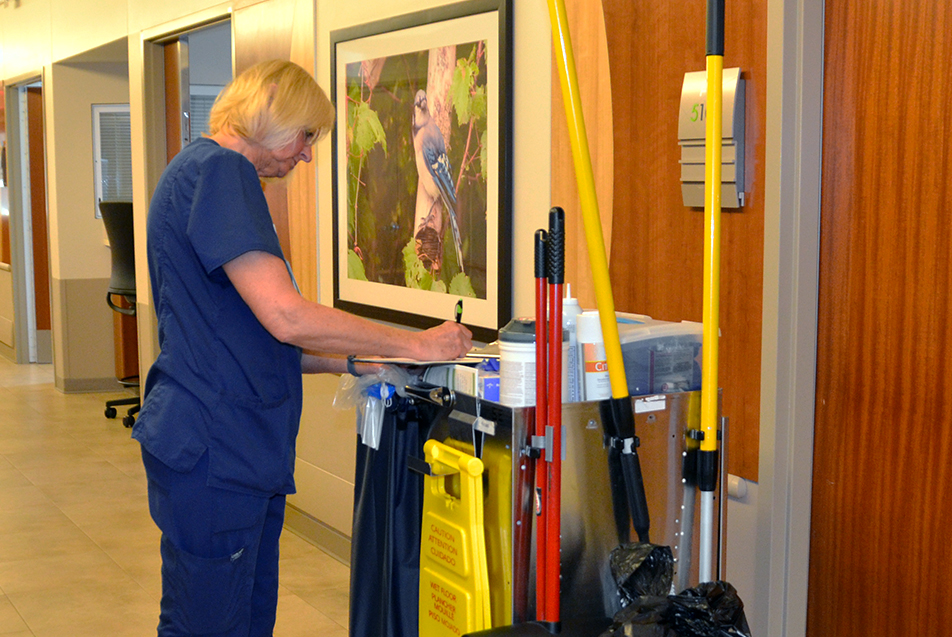
There’s another condition Dianna connects with, for very personal reasons.“You know, I was an addict,” she shared, as she worked her way around the second room, empty, as the patient was out walking laps around the floor. “I struggled with alcohol and prescription drugs.” After becoming sober more than four years ago, Dianna took a career leap and went into full time ministry for others battling addiction. After that venture fell through, she spent much of 2017 unemployed. “But no bill went unpaid,” she said. “The generosity from people during that time in my life was amazing.”
In late 2017, Dianna’s sister, Karen Clark, patient access services representative, helped her get a job at Parkview, working part time as an environmental services tech. “I did not want to work here!” she laughed. “People kept telling me that God had a plan. And they were right. Now I know that this is ministry. It just looks different.” For Dianna, each encounter is an opening. It’s an opportunity to make a difference for someone.
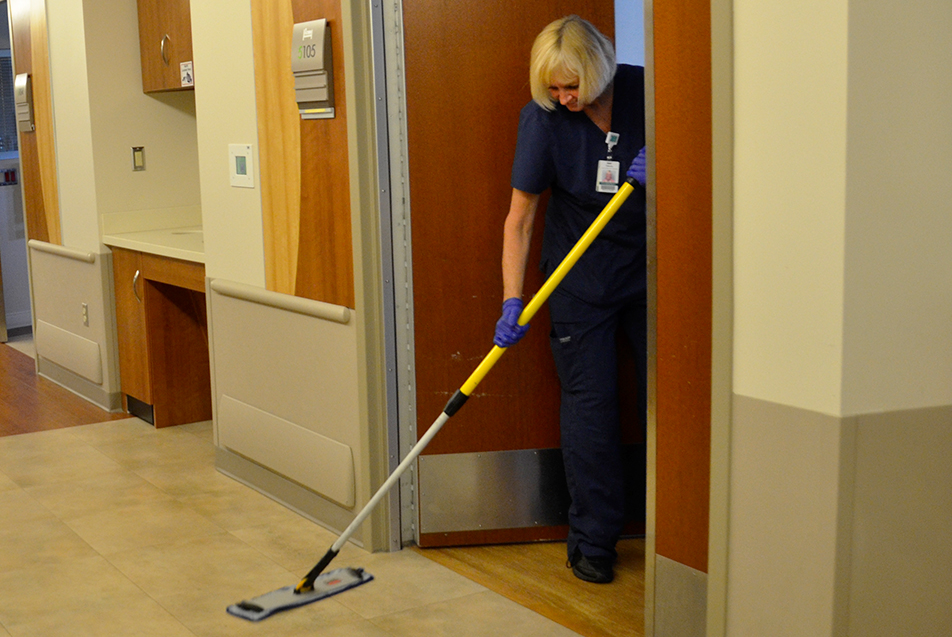
“I’m very open about where I came from and what I did, and that can make a difference. For example, there was this one patient, and he was here for about a week. I’m not allowed to ask them anything, but if they want to tell me things, I’ll always listen. This particular patient was feeling pretty low. I came in the first day and offered to open the blinds, and he said nothing. I asked again on the second day and he declined. But on the third day – I swear there’s something magical about the third day here – he agreed to let me open them just a bit. And that was it. Ding dong, there’s the door! That was the opening. He told me about his addiction issues, and I shared my own. I told him that it’s ‘never too late to change’, because I truly believe that. I was in his room for 30 minutes finding things to clean. I just listened. That’s all people really want.” As she spoke, she placed the barcode scanner back in its cradle and dusted the screens. “You know, I feel like I planted a seed that day. I never judge people or listen to others’ opinions. If they want me to know something about them, they’ll tell me themselves.”
Dianna had lots of stories similar to this one. Like the dementia patient who stayed on her floor for two weeks. Each day she would reintroduce herself and politely engage in a similar conversation to one she’d shared the day before. Until the day he left, when he called her out by name and wished her well. In her short time at Parkview, Dianna’s accumulated an impressive collection of these interactions, but the pink hat story is by far her favorite to share. “It wasn’t a big deal. I just packed instead of buying my lunch that week.”
But it is a big deal, particularly to the patients and their loved ones. I’d imagine that if all of the people Dianna has touched were to stand together, it would likely look like a field of wildflowers, the product of so many thoughtful seeds planted by a truly well-intentioned heart.
After her 9:30 a.m.break, we walked in for another daily and the patient perked up immediately. He was eating his lunch and Dianna was quick to question what he chose for his midday meal. (Food was one of her favorite topics to cover.) Completely unprompted, the gentleman started raving about his care. “It’s people like you,” he said. “Like yesterday … I was feeling pretty low and then you came in and I felt so much better.” She smiled over her shoulder as she swiped her rag across the hand rail. I never saw her break her stride that day, even when receiving a compliment.
By the time we sat down for lunch, there were just two dailies left to do. “Not bad,” she shrugged. On 5-East, there is rarely an empty room, but Dianna doesn’t mind one bit. It just means more opportunities to serve, more openings to connect. She pulled a seemingly random collection of lunch options from her tote in the breakroom and picked back up with her favorite topic. “I like to love on the patients who look like they need it the most,” she said. “It’s so much more than servicing a room. It’s a job, but it’s a bigger than that, too. It’s about the relationships.” Certainly Dianna and the other techs in our facilities don’t carry medications or the knowledge of a surgeon with hundreds of operations under her belt. But they are healers, make no mistake.
Her current role is Dianna’s third position in less than a year. She worked part time throughout the hospital, as well as a brief stint in the Intensive Care Unit (ICU) before being moved again at the request of coworker. “The guy who had this floor before me – we called him ‘the ninja’ – when he left, he said he wanted me to have his rooms because he knew I would take care of them. That meant a lot to me.”
Around 1 p.m., while she was completing one of her last dailies, the pager in Dianna’s pocket started to buzz. “A checkout,” she told me. The techs have one hour to turn over a room once they walk in. When she mentioned it involved a “deeper clean”, I thought she meant just a little extra elbow grease. I underestimated Parkview’s standards. I stood with my back against the counter as Dianna went about the business of breaking down the bed. She stripped sheets and removed the head and foot rails and flipped the mattress over before grabbing a rag and aggressively scrubbing the surfaces.
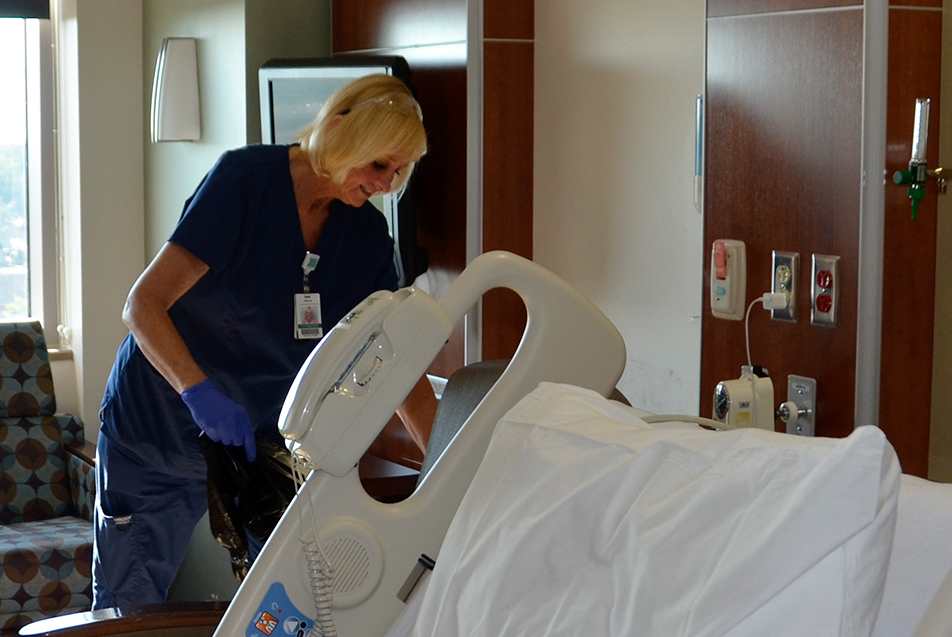
I looked on as she moved furniture and opened recliners. She pulled every cord away from the wall and ran them through her rag before neatly recoiling them and hanging them in place. She wiped down trash containers and telephones and drawers. There wasn’t an inch of the room she didn’t touch, and I felt exhausted as a mere observer.
Satisfied with her efforts, she looked up at the clock and jotted down the time. We were ready for the splash and dash. One of her final duties of the day was to peak in on patients and see if they had any housekeeping needs before she turned them over to the second shift. Like a mother hen doting over a row of her chicks, Dianna tapped on door after door. She’d lean in ever so slightly and say, “Is there anything else I can get you before I leave for the day?” There were a few requests, mostly towels and things just out of reach, but mostly I believe they were satisfied with just one more dose of sunshine.
We went into the utility closet so Dianna could stock her cart and show me some of her floor’s certificates. Patients are polled after their stay with us, and a satisfaction score is awarded based on their feedback. Currently, the 5th floor’s satisfaction score is 87 percent. “I won’t be happy until it’s 90,” she said, holding the decorative paper in her hands.
Standing in that small room, knowing I had just minutes left with Dianna, I could see her and her work for what it was. This is a ministry for Dianna. Maybe instead of hymnals, she carries rags and she stands behind a cart instead of a pulpit, but it is a spiritual service just the same. And I was leaving a believer.
It’s how she looks into people’s eyes, regardless of the scars or situations they bring with them, and how she always checks the board and addresses the patients by their first names. She said it herself: “The smallest things can make all the difference in the world.” That attention to the soul, paired with the gifts of time and empathy, are the foundation for restoring faith in humanity. “I come to work everyday to be more than a housekeeper,” she said. “Everyone has a story. You just have to listen.”

